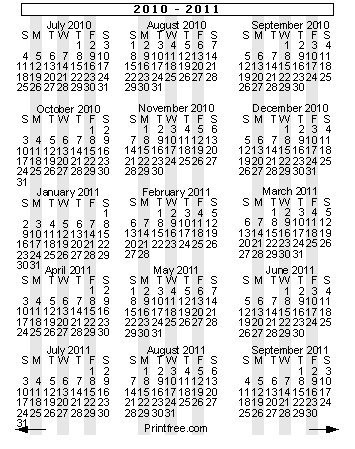skip to main |
skip to sidebar
2011 CALENDAR WITH BANK HOLIDAYS
In January 2007, the St Andrew's Day Bank Holiday (Scotland) Act 2007 was given royal assent, making 30 November (or the nearest Monday if a weekend) a bank holiday in Scotland. From 1965 the date of the August bank holiday was changed to the end of the month. Curiously, there were a few years (e.g. 1968) when this holiday fell in September, but this no longer occurs - presumably reflecting a change in the way of defining the relevant day. The Whitsun bank holiday (Whit Monday) was replaced by the Late Spring Bank Holiday - fixed as the last Monday in May - in 1971. Exactly a century after the 1871 Act, the Banking and Financial Dealings Act 1971, which currently regulates bank holidays in the UK, was passed. The majority of the current bank holidays were specified in the 1971 Act, but New Year's Day and May Day were introduced after 1971. In 1903, the Bank Holiday (Ireland) Act added 17 March, Saint Patrick's Day, as a bank holiday for Ireland only. The act did not specify Good Friday and Christmas Day as bank holidays in England, Wales, and Ireland because they were already recognised as common law holidays, and because of common observance, they became customary holidays since before records began. Prior to 1834, the Bank of England observed about thirty-three saints' days and religious festivals as holidays, but in 1834, this was reduced to just four: 1 May (May Day), 1 November (All Saints Day), Good Friday, and Christmas Day. In 1871, the first legislation relating to bank holidays was passed when Liberal Politician and Banker Sir John Lubbock introduced the Bank Holidays Act 1871, which specified the days in the table set out below. Sir John was an enthusiastic supporter of cricket and was firmly of the belief that bank employees should have the opportunity to participate in and attend matches when they were scheduled. Included in the dates of bank holidays are therefore dates when cricket games were traditionally played between the villages in the region where Sir John was raised.[citation needed] The English people were so thankful that they called the first Bank Holidays 'St. Lubbock's Days' for a while. Scotland was treated separately because of its separate traditions; for example, New Year is a more important holiday there.[citation needed] The very first Bank Holiday began in 1781 when banker Henry James Earl of Cambleseed controversially decided to take the first Monday in May off work, closing his bank to the public. His local competitors then followed suit, taking days off over the traditional Easter period. A bank holiday is a public holiday in the United Kingdom or in Ireland. There is no automatic right to time off on these days, although the majority of the population is granted time off work or extra pay for working on these days, depending on their contract. The first official bank holidays were the four days named in the Bank Holidays Act 1871, but today the term is colloquially used for public holidays which are not officially bank holidays, for example Good Friday and Christmas Day.























No comments:
Post a Comment